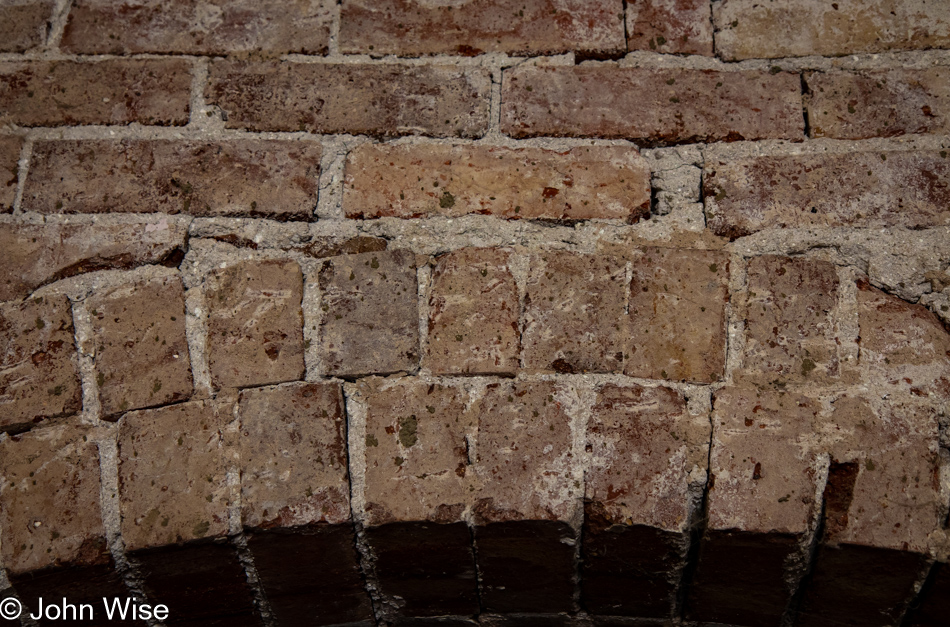
It’s Sunday, and we all know what that means. No, we will not be going to church, though last night, the conversation at dinner did turn to Radical Amishism it was probably more in the sense of a fashion statement than a set of principles and doctrines to live by. Oh yeah, back to Sunday. It is the end of the weekend, and we’ll be returning home today after our ever-so-brief pause out here in the ever-shrinking town of Duncan, Arizona. Before I get too far ahead of myself or gather too much distance to my obtuse reference regarding Radical Amishism, Clayton, seeing the book I’m reading, thought he’d read the title correctly until, on second glance, he saw that it is Radical Animism.
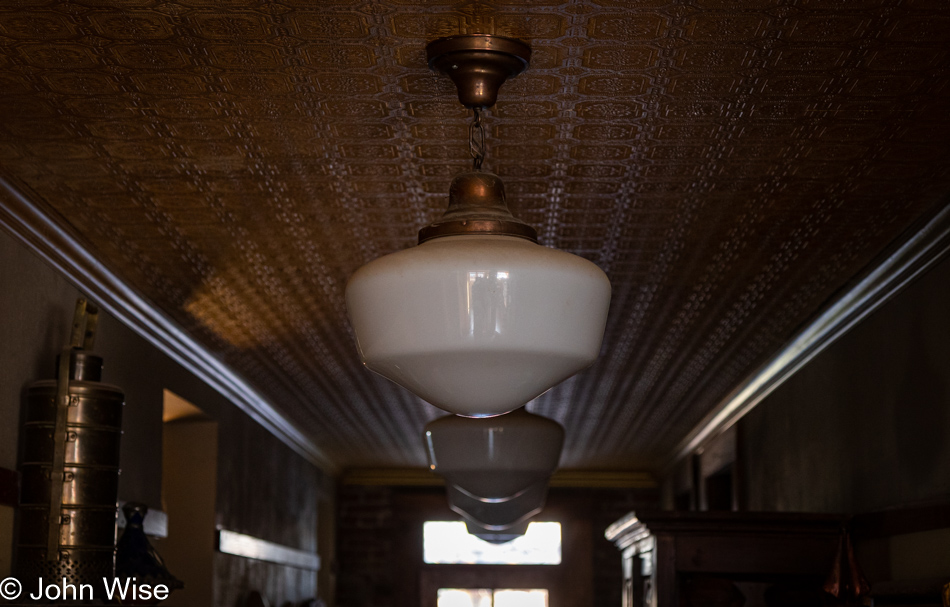
If it were 40 years earlier and I understood back then that I didn’t require institutional validation to allow me to write, today I just might be the author of Radical Amishism because, after a quick glance into my imagination and a minor amount of consideration, I’d be down with it. I’d have picked up where Edward Abbey left off with Desert Solitaire, taking some of his ideas into the eastern farmlands of the United States where a radical band of Amish farmers becomes psilocybin mushroom growers, working with Humphry Osmond to change the toxic psychological profile of America following the harmful influence of Ayn Rand and her brand of success regardless of cost. But this is a silly exercise that will go nowhere as my flight of fancy is nothing more than a tactic to distract myself from having to write about why I like the light fixtures in the hallway of the hotel against an antique ceiling.
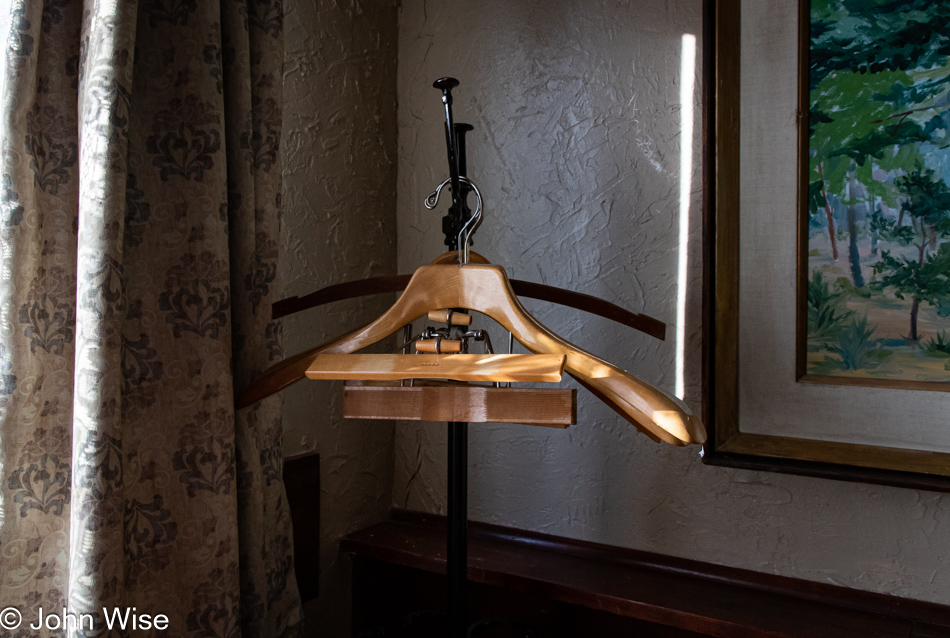
Had I invested a bit more in that machination, maybe I’d have had enough material to cascade past the previous photo to fall under this photo of the coatrack, which stands in the corner of the Library Room we have occupied. The truth is that there is nothing of real interest in capturing this other than there were qualities of light I was enjoying and a hint of an idea that the small details in the room that are not defining attributes of the place might allow granular memories of our time here that couldn’t be had with a greater overview captured in a previous visit.
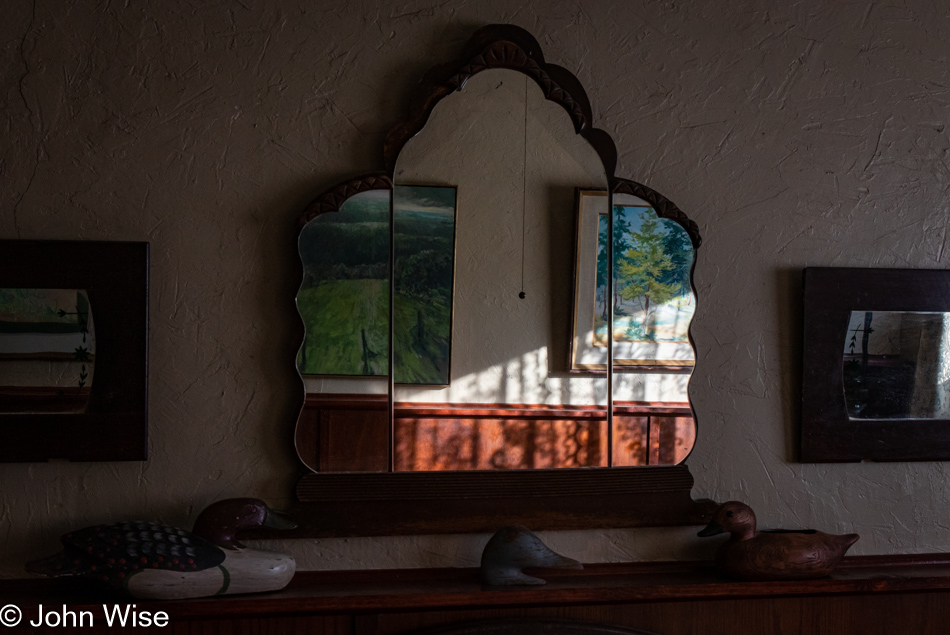
Soon, a gourmet refection will be presented that will inch us closer to the conclusion of our time of intentional languishing where we were someplace other than home. While we’ll be leaving at some point after noon, our state of mind of being elsewhere will continue as the abundance of wildflowers we’d seen on the drive out will have us gawking along the way to capture yet more memories of the rare occasions when their bursts of color carpets the landscape.
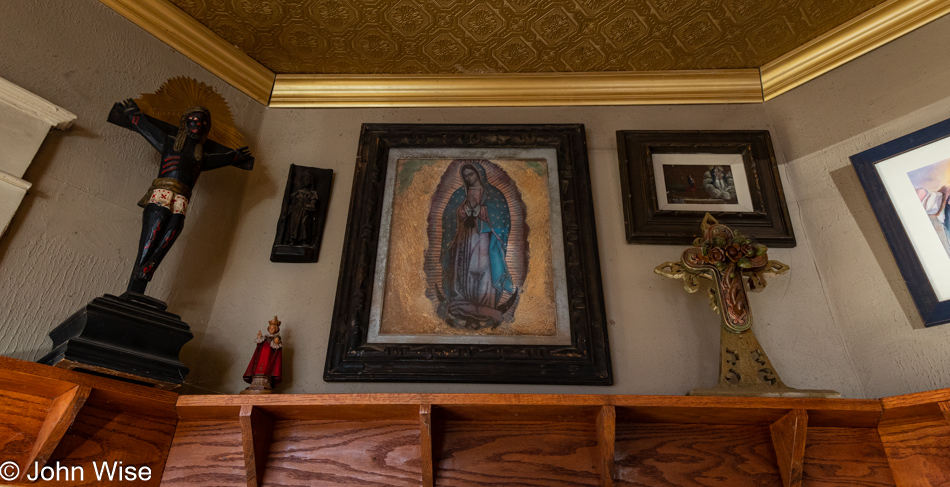
Not only do the enticing aromas of our evolving meal waft from the kitchen so do the sounds of Piano Sonata No. 3 in B Minor from Chopin as it keeps time with the old clock ticking off the seconds of the day here in the parlor. That clock just might be part of the allure, but so might the concerted effort to romanticize the simultaneous simplicity and sophistication of our moments spent among the ghosts of another time.
Let us return to this idea of a refection. You might have been wondering if I’d found this word in the thesaurus, and that is exactly where it came from. I originally wrote “repast,” but on my third reading, it felt a bit too archaic, and I didn’t want to use “meal” for the sixth time in this post. Looking for an alternative, I came across this word that was new to me. The dictionary defines refection as a refreshment by food or drink, but wait, there’s more. In zoology, this word describes partly digested fecal pellets. As one not familiar with such an idea, ChatGPT came to the rescue to inform its humans that:
Partially digested fecal pellets are usually found in animals that have a digestive system that requires them to eat their feces. For example, rabbits eat their feces as it is an important part of the digestive process. Rabbits’ digestive systems can’t extract all the nutrients from food the first time it is digested. During the digestion process, soft pellets called cecotropes are formed. Termites are another example of animals that produce fecal pellets.
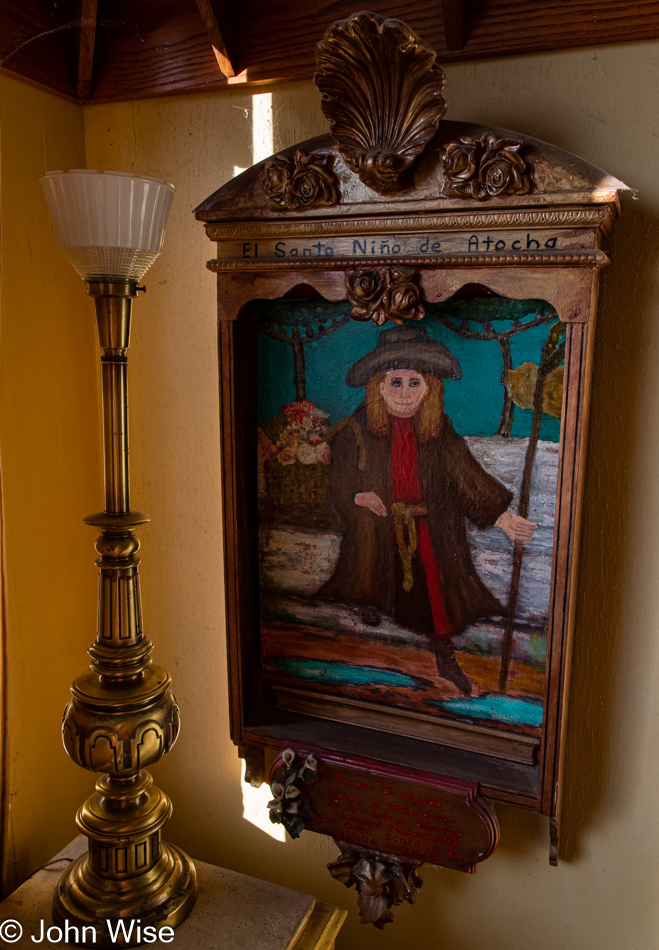
Can you guess where this goes next? My follow-up book to the 1983 bestseller Radical Amishism was Refection Recipes of the Radical Amish Psychedelic Pioneers. Who hasn’t thought while tripping on shrooms that eating one’s own partly-digested fecal pellets might kick a second time? As someone who doesn’t exactly relish the idea of eating poop, a cookbook was in order.
Now, before you go thinking, this is gross, John, I agree, but this is Sunday, and I swear that some of this is a product of automatic writing influenced by this painting of Santo Niño de Atocha. Yep, that’s exactly how this got here.

The cat is calling bullshit; you can see it in his stare.
The sun has been pouring in on us through the two large picture windows while Chef Clayton continues to busy himself in the kitchen. Intermittently, he pops over, mumbling something about Ezekiel the Radical Amish Clown as Caroline fends off Fabio the Cat with the whole commotion disturbing my reading of Jack Mendelsohn’s Being Liberal in an Illiberal Age: Why I Am a Unitarian Universalist.

Is anyone here in need of a baptism? John 03:19 is on hand for administering the sacrament of admission to the Radical Amish Church today. Please don’t confuse this reference to today’s date with the biblical quote of John 3:19, which states, “God’s light came into the world, but people loved the darkness more than the light, for their actions were evil.” From the 1991 manga version of the Radical Amish Bible page 126, the thought bubble as spoken by Santo Niño de Atocha read, “John’s light was murky, but people loved the murk as it reminded them of feasting on their refection.”

General Antonio Lopez de Santa Ana Huevos Rancheros, a.k.a. a Gentleman’s Huevos, have been brought to the table, and to call this concoction exquisite wouldn’t adequately share the delight that was had. I recognize that this indulgence reflects my own lack of culinary acumen as, comparatively, I am making food for rabbits and termites that fatten us but fail to alight the soul. Our meal was taken to the sounds of Alicia de Larrocha’s Granado, and as it faded, our morning ritual approached an end, too.
Our conversation moves from the table to the kitchen as we discuss the art found in the ritual of preparing a meal. In a sad moment of self-awareness, I must admit that my ideas of intentionality pale in comparison to someone who exercises his will to affect and deliver a quality of life that far surpasses my own feeble attempts. Maybe I can learn a thing or two about the life of the gentlemen by taking on Clayton’s reference to Baldesar Castiglione’s Book of the Courtier. It was while speaking of Castiglione that our host shared this wonderful paraphrasing, “The definition of a gentleman is someone who derives no pleasure from seeing another creature suffer,”
My encounters with people of expansive minds remind me of just how small my own is, and yet, on many occasions, I’m well aware that I’m among other people with smaller minds than my own. While I’m not ashamed of how accidentally my life unfolds, I know that there has been much intentionality that has propelled Caroline and me into the myriad of adventures and experiences we’ve been so fortunate to encounter. It’s a good day when I see that there is still ample room for me to redouble my efforts. This has me wondering how those who never encounter others who could mentor them by exemplifying the more refined aspects of life have been so effective in allowing their languishing souls to disguise just how unrefined and vulgar they are. It is one thing to be born a Neanderthal but another to die as one without ever becoming aware of the knuckle-dragging existence we exhibited while wearing our best troglodytic personas.

Time to leave the peaceful air of the Simpson and venture into the blustering force of brisk wind where the sun might wash self-doubt from these burdened shoulders. Mind you, I’m well aware that life is good, and I’m genuinely encouraged that there always seems to be room for improvement. Walking is a good place to return to for the clearing of the mind and resolving some of the ambiguity, so out we go.
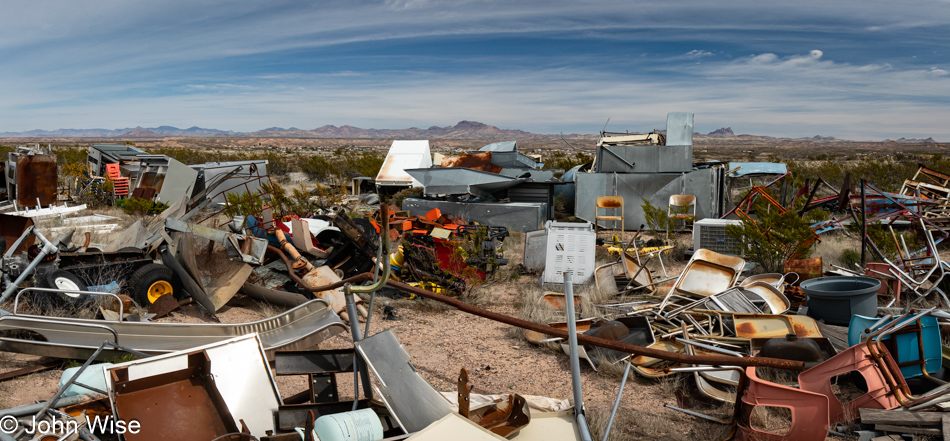
Tragically, my walking around town observing things suggests that maybe I’m on the verge of being cast off as junk like so many of these discarded artifacts that no longer hold utility. Well, in that case, I suppose that at least until nature reclaims those things that provoked these musings, my hulking form will have to strive harder to leave enough remnants on the intellectual landscape for people to walk by and maybe wonder what the mind of John did in the utility of others before his abandonment of life.
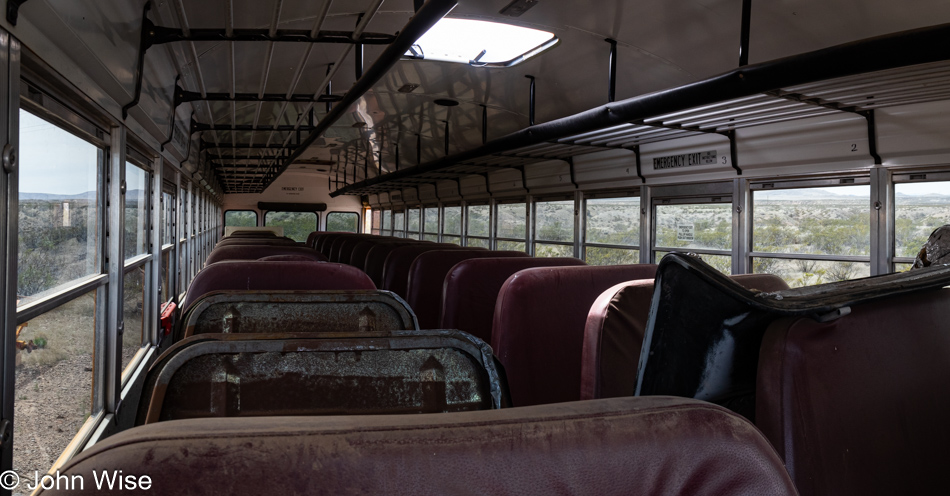
This old rusting school bus no longer brings children to school; its value is lost. Then again, when was the last time the name of Ibn al-Haytham and his seminal book Kitab al-Manazir came up regarding the discussion of light and vision? Even a contemporary great such as Professor Thomas G. Brown at the University of Rochester is not a name that falls from the tip of our tongues, and yet his work on cylindrical vector beams is undeniably important to our modern way of life. Just the other day, I was discussing with Caroline the metrology of photonic integrated circuits with an emphasis on measuring the in-situ polarization state within a silicon nitride waveguide, which is currently Professor Brown’s major area of interest when we realized that we cannot even count one other person we know interested in such subjects. What does this have to do with school buses cast off on the junk heap of former utility? Maybe nothing other than an idea that asks if it’s possible that all knowledge, pioneers, thinkers, artists, and musicians are ultimately nothing more than a bunch of junk nobody cares about if it doesn’t lend itself to immediate gratification led by foolish hedonism?

But what is this? A broken-down soda dispenser? Yes and no, you see in this image is the data of what it is, or was. At some point, its data will be eaten by Artificial Intelligence, and as pockets of our population fall into a dark age, the electronic brain will remember and understand what we are losing. Just consider that with the fall of Rome in the 5th century, the recipe for how they made such durable concrete was lost for the next 1,300 years; what are we on the verge of losing?
Take my example regarding Ibn al-Haytham and Professor Brown. It was in the 13th century, a little more than 150 years after Kitab al-Manazir (Book of Optics) was written, when Roger Bacon was inspired by this work to study optics and eyeballs, leading him to describe lenses that would correct our vision and create telescopes along with inventing the magnifying glass. About four-hundred fifty years later, Johannes Kepler, Isaac Newton, and Galileo Galilei would also find the work of Ibn al-Haytham instrumental to their discoveries. But what about Professor Brown’s relationship to all of this? There’s a likelihood that either his research or that of those he’s influenced is going to be integrated into optical computing, which is the future of that field. I used ChatGPT to explore these connections, and at some point, its algorithms will utilize over 1,000 years of research and development in optics to intuitively understand these connections in ways only those with very specialized knowledge can grasp. Meanwhile, we humans walk around obliviously looking at rusting junk and other trash, probably on the way to no longer having any value either.

None of us use payphones anymore; when will we forsake books, computers, and even conversations required for the exploration of knowledge? I grew up in an age where knowledge was secondary to the acquisition of stuff that embodied the American dream. Today, generations are growing up with nearly no idea at all of what role knowledge might play in their lives. They are uncertain about careers, financial opportunities, or having children. Our ambition to excel has been replaced with the ambiguity of not being able to figure out the nonsense, violence, and incoherence emanating out of previous generations, afraid of a future where thinking people might abandon accepted conventions of conformity that served a ruling elite.

Speaking of elites, the Charismatics were out in force this Sunday, though you wouldn’t have known it if you were listening for their shrieks. Only the mass of their cars indicated that they were congregating in the church/shed. While we were tempted to poke our heads in to watch and listen to them speaking in hands and laying on tongues, our wild imaginations suggested they would recognize us as outsider infidels and chase us with snakes to banish our evil presence. Our flight of fancy was probably far more entertaining than the creepy reality we’d have likely found in the First Baptist Church of Duncan. This photo is just an old house for sale, not the den of those “slain in the Spirit.”
Back at the Simpson, the clock is somehow off, showing us a time between. Just how long we had been out and wallowing in the destitution that is Duncan becomes the passage of unknowns. There is an inescapable sense of what was once out this way when people had hope and dreams but has been stolen by the relentless force of time going forward. Fleeting glimpses of renewed aspirations can be seen here and there, but something just as quickly began erasing those efforts. Futility creeps into the fool who believes that America can be renewed. The edges and outposts decay on a margin where the casual observer moving by in their car might hardly notice the scale of what is collapsing.

The coherence of cloth impacts its utility. If, through defect or wear, the assemblage begins to fall apart, someone must mend the fabric, or the original intention of its creation will be lost, and the article can be disposed of or recycled. The coherence of people in relationship to the potential of available knowledge has traditionally been woven into a tapestry of greater meaning and utility, but at this juncture, we are coming apart at the seams and apparently have no one able to mend the decaying fabric of what we could be.
It is obvious to me that humanity requires the genius of the weavers and seamstresses of the past to design a new kind of cloth that better lays bare the arrogance of our stupidity. We’ve been using masks and cloaks in the form of accumulated things to hide the state of intellectual nakedness instead of facing the damage we inflict not only on our planet but upon one another, too. Just as we are evolving an artificial knowledge that will exceed everything that came before it, we are relinquishing our very humanity in support of unsustainable dreams that are grotesque folly.